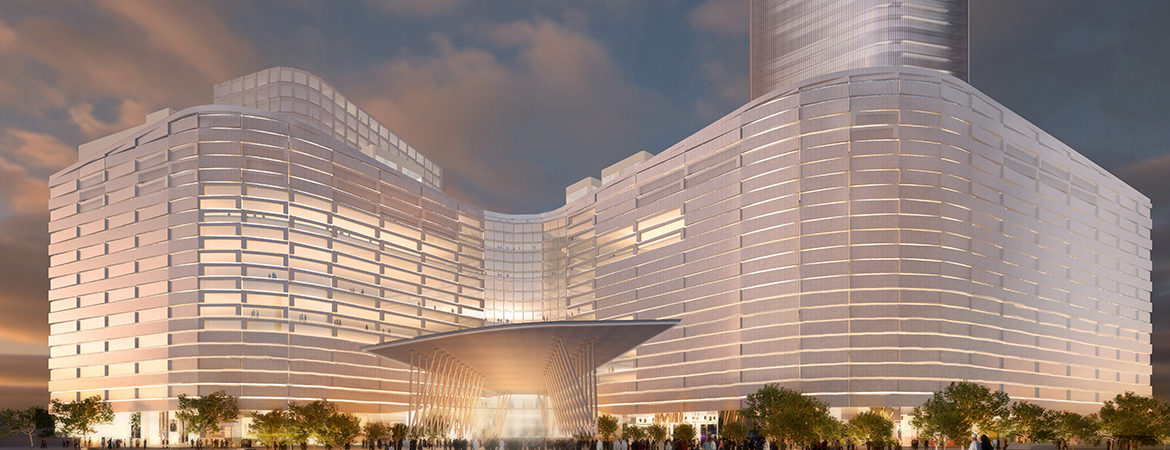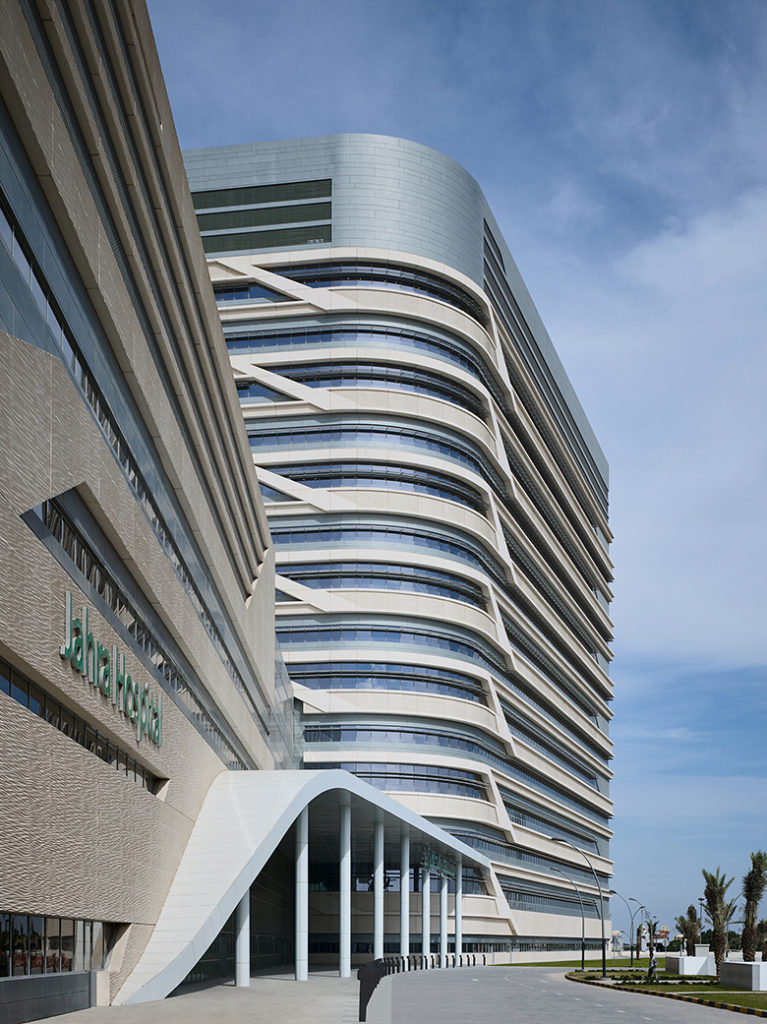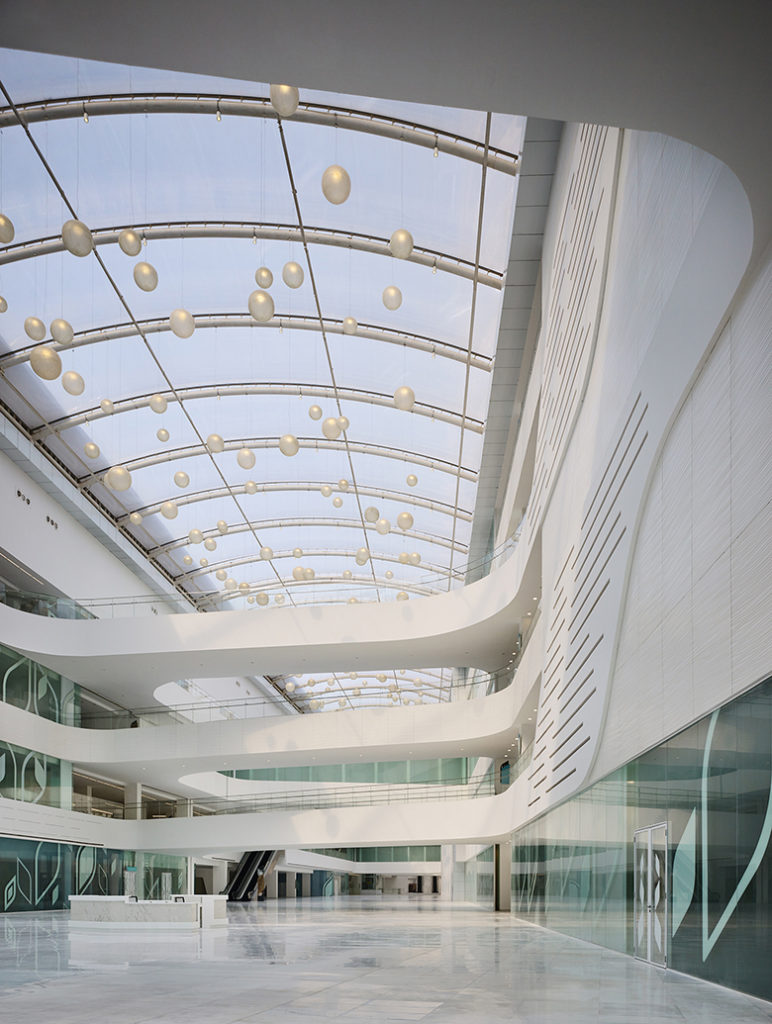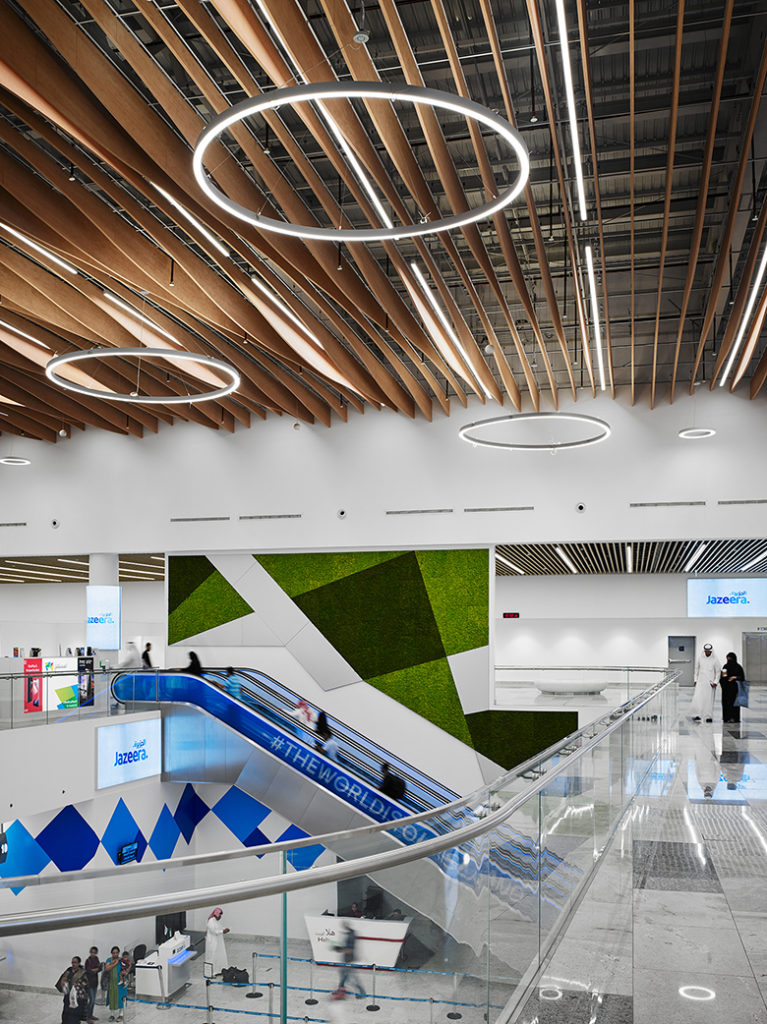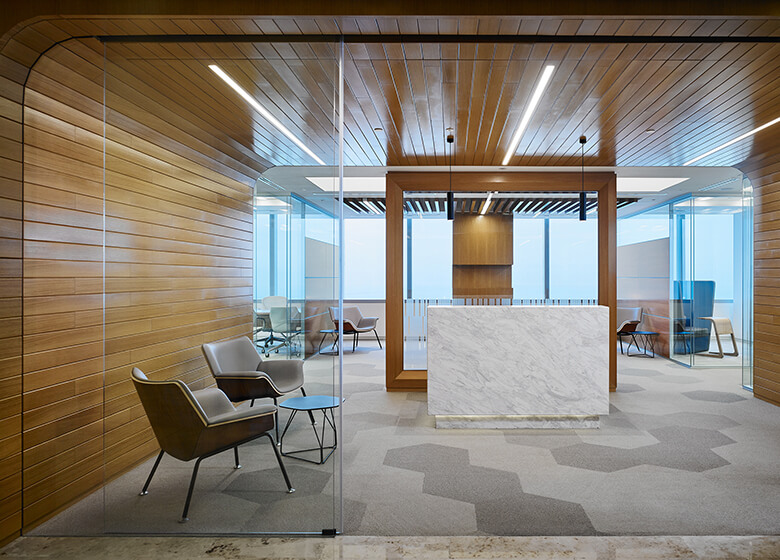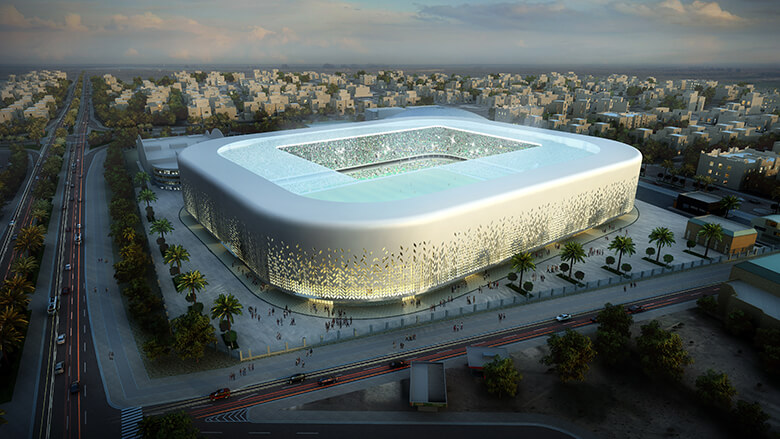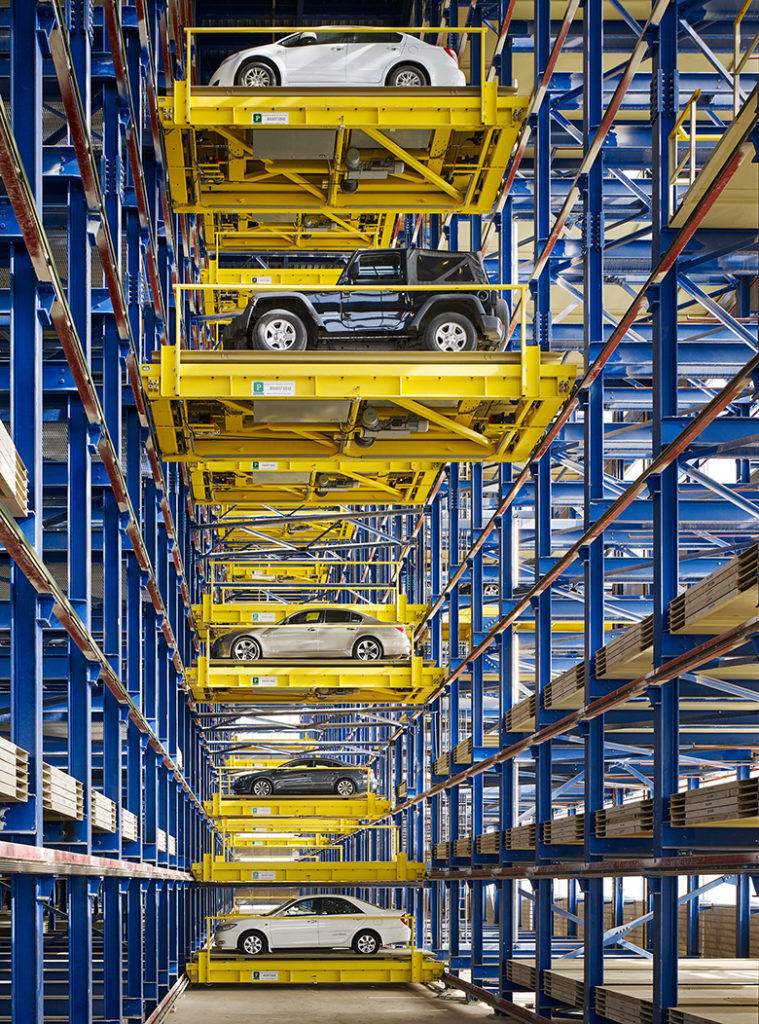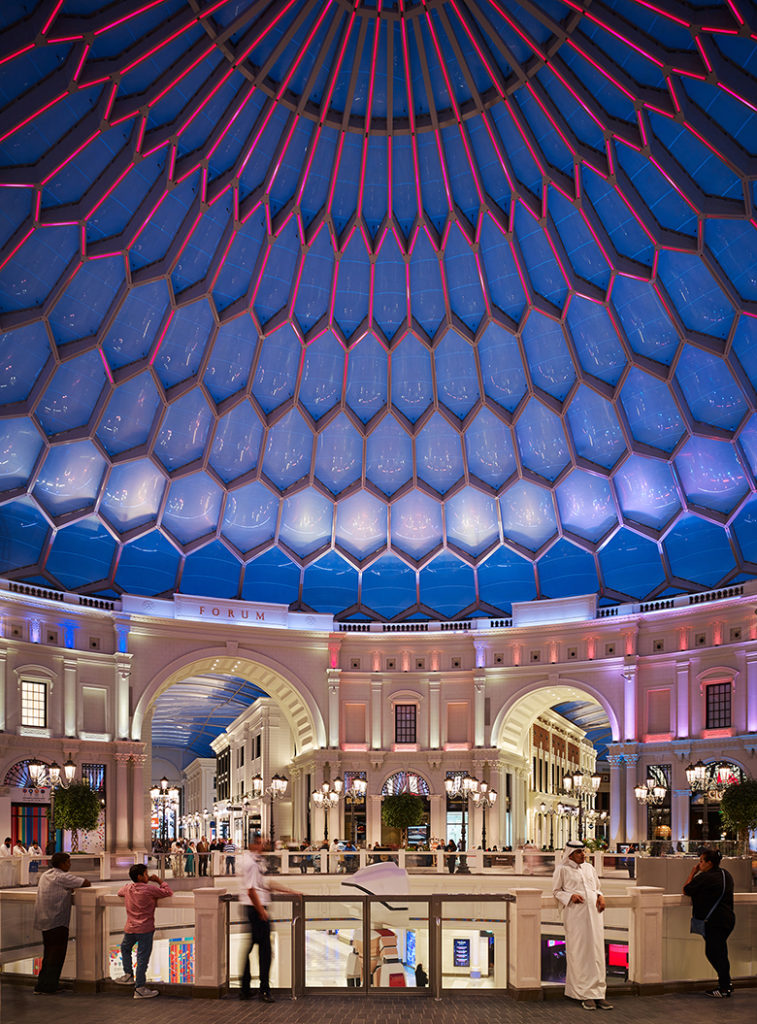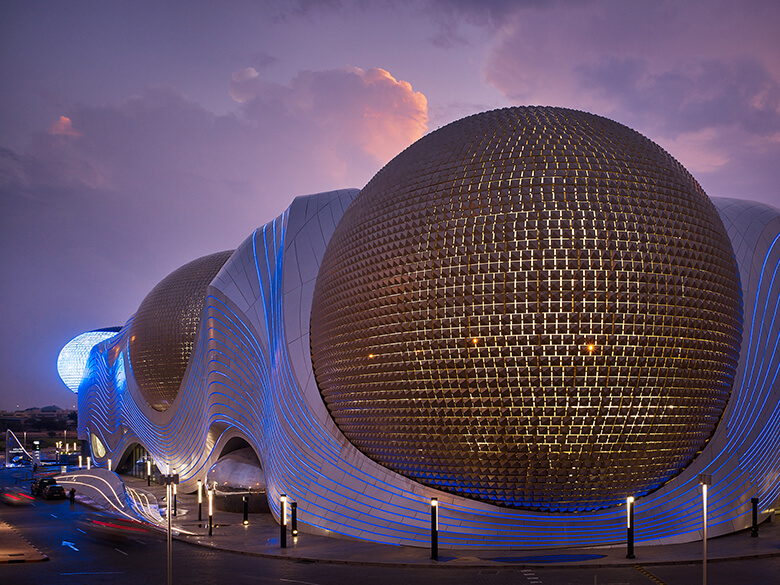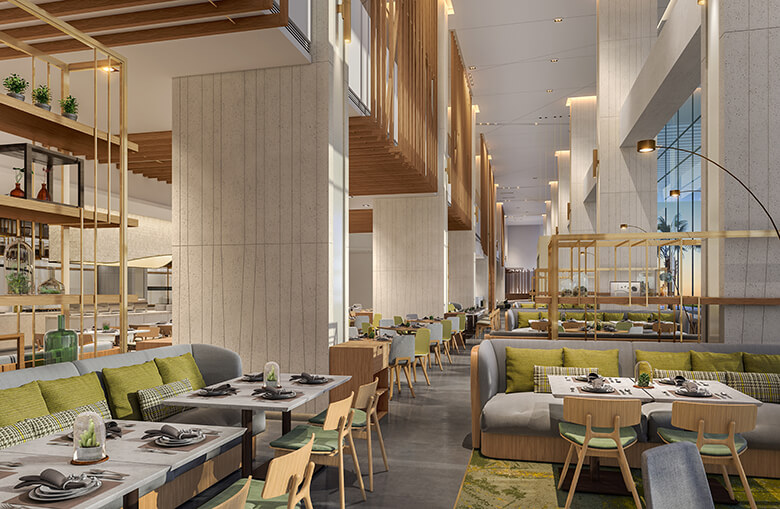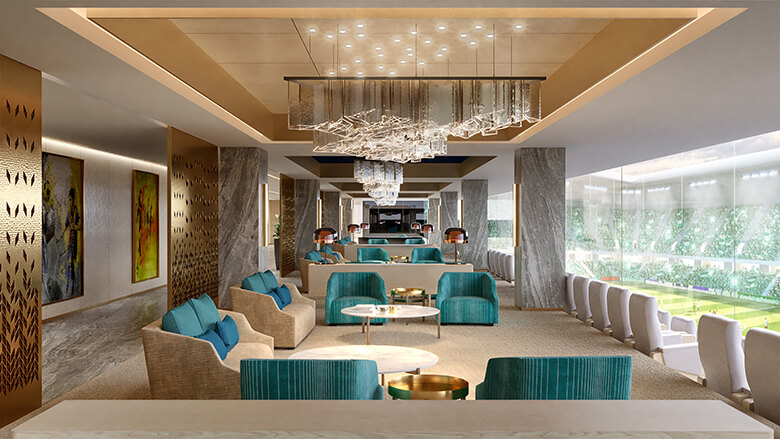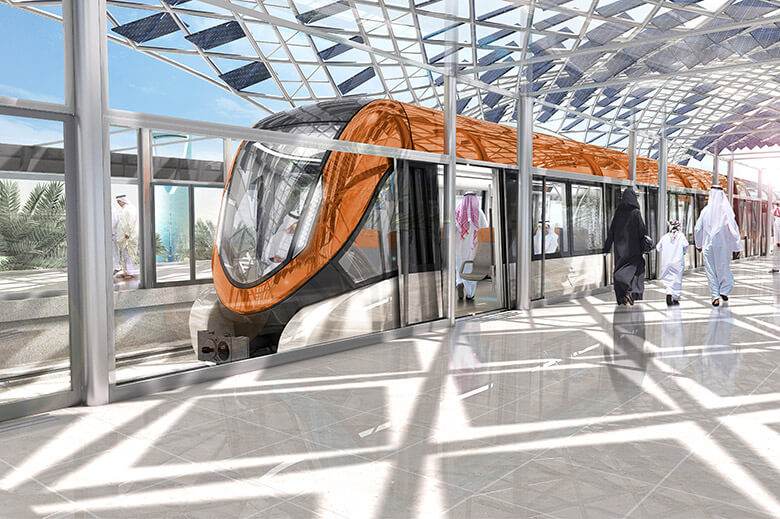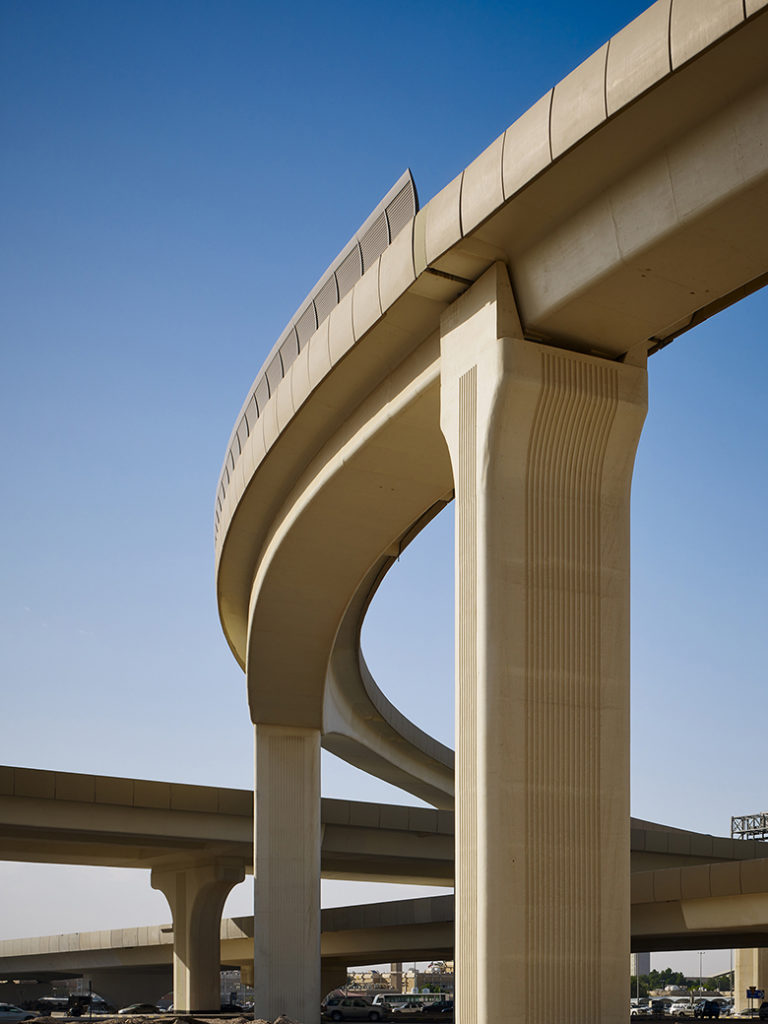Pace is a full service architecture, engineering and planning firm that crafts buildings and interior spaces in order to bring a unique identity to each project.
It is renowned for embracing the new, temporal and experimental with a spirit of innovation and, since its inception in 1968 in Kuwait, has played a major role in the country’s transformation, leaving an indelible mark upon the country’s modern history by giving it the finest quality architecture and infrastructure development, in tandem with the highest international standards of design excellence. Indeed, over the course of 50 years, Pace has made significant contributions to the urban development of the entire region, influencing its metropolitan planning and landscape.
Right
from the early days, Pace concentrated its efforts on designing unforgetable
buildings and structures. It started big in the 60s, and has been entrusted by
many prominent clients to take on a large number of high-profile projects that
were large in magnitude and exceptionally diverse. Pace’s earliest projects
included the very first Al-Ahli Bank of Kuwait HQ, Kuwait Shipping Company HQ, and
Kuwait Aviation Fuelling Company.
Advancing through the 80’s and the 90’s, Pace has experienced significant
growth and has managed to deliver a broad array of iconic projects, not only in
Kuwait, but across the GCC. These projects include
Kuwait Fund for Arab Economic Development HQ, The Joint Banking Centre in
Kuwait City, and the Al Bahrain Arab African Bank. Pace also delivered the
outstanding Kuwait University Khaldiya Campus and the Kuwait Government
Building in Astana, Kazakhstan.
The result of this ongoing success saw Pace usher into the 21st century as a strong market leader and influencer, with a rich portfolio of world-class projects that invited an even wider range of public and private sector clients to work with the firm. Projects undertaken and delivered by Pace across Africa, for instance, include the Ayos Bonis Road in Cameroon, Gore Gambela Road upgrading in Ethiopia, and a huge central power plant in Mali.
The firm has also worked relentlessly on creating a pool of talent in the region. This has been achieved by attracting exceptional people from across the globe, and by fostering a creative mindset among graduates, establishing itself as an educational institution for promising architects and engineers.
Pace continues to deliver projects across the region for a wide range of clients and market sectors, notably retail, healthcare and mega-infrastructure projects. Its portfolio of work spans planning, property and infrastructure delivery, with the firm bringing a unique value-driven way of thinking to each and every project. Widespread experience working alongside developers, where time is money, means that Pace has learned to do things smarter, and in doing so it gets the most value out of every budget dinar.
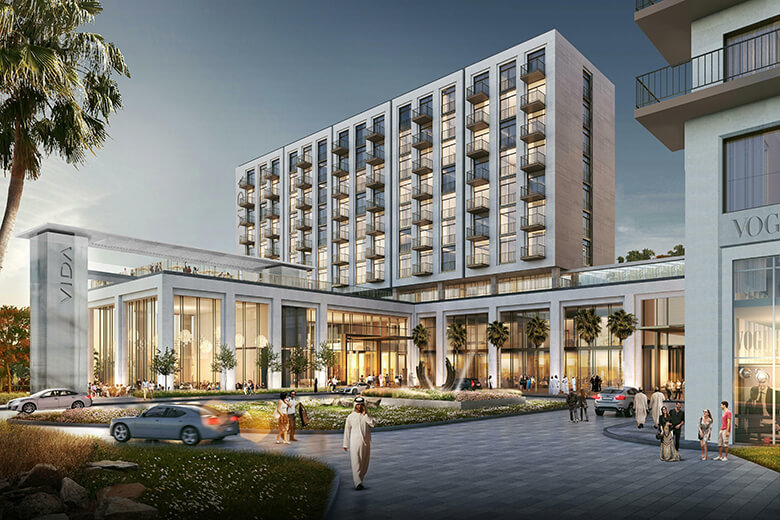
Success, Growth and Change
As it celebrates its 50th anniversary, the firm realises that this is a milestone that could not have been reached without the efforts of all of its employees, past and present. Pace is fortunate that its founder started the firm on a strong footing. Moreover, one of the primary reasons that Pace has enjoyed consistent growth and success over the years is its ability to adapt and be flexible in meeting changing markets. Its success also comes from its reliability, common sense, and commitment to treating its clients with consideration and respect.
Throughout this first half of the 20th century, Pace has delivered over 1,250 successful projects in every sector imaginable. These include such blue-chip developments such as Avenues Phase IV, Riyadh Metro, Kuwait University Administration Facilities, Jahra and Abdel Nasser Roads, Jahra Medical City Hospital, Kuwait National Museum, New Jazeera Airways Terminal and Marassi Al Bahrain.
The firm’s 50th year has been defined by success, growth and change throughout the organisation. A campaign was launched to celebrate both its history and forward direction, which reached far and wide across the region, culminating in the ‘50 Years of Architecture in Kuwait’ cultural exhibition that took place in Shaheed Park, Kuwait City, in October. The exhibit offered a unique insight into the iconic architecture of Kuwait, commemorating its evolution throughout the past five decades.
The ‘50 Years of Architecture in Kuwait’ exhibition demonstrated the contrast between past and present Kuwait, borrowing elements of Kuwait’s iconic architecture and going beyond just architectural properties to present them as the dramatic sculptural forms. The event was a great success and the company is extremely proud to have brought this to Kuwait, not only for the wonderful staff within Pace, but for the wider public to celebrate the rich architectural tapestry of Kuwait and the wider region.
The work to celebrate the company’s heritage and future continues into 2019 with the upcoming launch of ‘Pan-Arab Modernism’, a research publication that will launch globally, celebrating the history of architecture in the Middle East, harnessing Pace’s projects and archived data to inform the research.
The firm has continued to evolve and expand, going from strength to strength, delivering award-winning projects that help to shape both Kuwait and the wider region’s architectural landscape. “Pace’s landmark and award-winning projects are now recognised elements of Kuwait’s skyline,” explains the firms Chief Executive Officer, Tarek Shuaib. “A number of our projects have even been featured on postage stamps and the Kuwaiti currency. Others have replicated across the region, such as the Avenues Mall model, which was duplicated in Bahrain.”
Today, Pace continues to evolve its brand and operations to ensure that it builds on its local reputation of quality, reliability, vision and integrity, transferring this onto the regional stage. This includes the expansion of its operations in Saudi Arabia and Bahrain.
A Pioneering Approach
Everyone within Pace has a passion for design excellence that drives the firm to solve complex and significant problems for its clients. This passion takes in creativity, adaptability, reliability, professionalism and efficiency.
Creativity
Pace understands that certain briefs require creative new strategies. With experts across several sectors, and innovative thinkers in every department, it is perfectly equipped to collaborate with clients in the early stages of concept and design.
Adaptability
The team at Pace also understand that every project needs to be treated independantly. Consequently, it adopts an analytical approach to the initial stages of each brief in order to identify the most appropriate solutions for the individual stages of each project. Thereafter, its flexible operational systems ensure that it makes the best use of the specialist expertise at its disposal in order to meet the specific requirements of the project.
Reliability
It is Pace’s consistency and reliability that its clients single out for particular praise. It’s one of the aspects of the business that the firm most proud of. Through tried and tested project management procedures, Pace ensure that nothing is ever left to chance.
Professionalism
From specialist consultancy roles to leading on large-scale infrastructure projects, Pace’s approach is always grounded by a fundamental respect for the profession. It is this professional commitment that has helped it to build its reputation both regionally and internationally.
Efficiency
Efficiency is a key priority for Pace throughout every stage of a project. It recognises that schedules and budgets are of paramount importance for all clients, and this has been one of the key ingredients of its success over the past five decades.
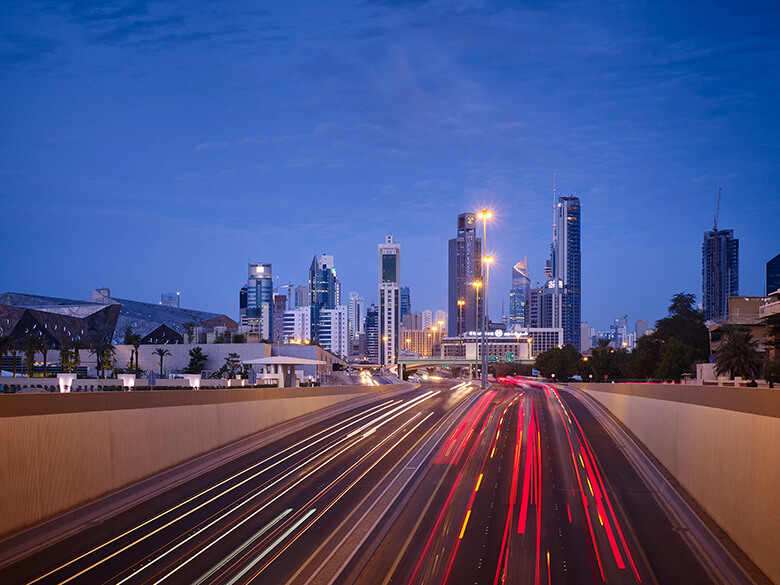
A Broad Portfolio
Pace strives for optimal solutions for every design challenge, creating enduring buildings that balance visions, programmes, aesthetics and budget. Its design process provides a framework for developing each project to accommodate the unique requirements of each individual client. Throughout the project, the firm encourages client participation and collaboration, resulting in the highest quality product.
Thanks to this forward-looking and enlightened business philosophy, Pace has recently completed a number of key projects, including The Avenues – Phase IV, which opened in March 2018. In addition, and fuelled by Pace’s fast-track construction solutions, the company has delivered and opened the Jazeera Airways Terminal (May 2018), and two months later the new Jahra Medical City, one of the largest healthcare projects in the region, inaugurated by His Highness the Amir of the State of Kuwait, Sheikh Sabah al-ahmad Al-Jaber Al-Sabah.
Pace has also reached important milestones for many of its ongoing projects, including the completion of all structural works for both the new Kuwait University City campus’ administration facilities project, and the multi-leveled Ghazali Interchange, which is part of the Jamal Abdul Nasser Street development project.
The past year has seen continued recognition for the company’s projects on the world stage too, winning and being shortlisted for a number of prestigious awards. In addition to winning MEED’s ‘Transport Project of the Year’ award, Pace has earned Kuwait its first global transport infrastructure accolade for the Jahra Road and Jamal Abdul Nasser Street development project, with the firm being recognised at the International Road Federation’s Global Road Achievement Awards (GRAA).
Pace continues its success at architectural awards with noteworthy wins at The American Institute of Architect Awards for the redevelopment of Sabah Al Salem Stadium, and at the World Architecture Festival Awards in Amsterdam, where The Avenues Phase IV was listed in the prestigious ‘Shopping – Completed Buildings’ category. The firm’s work was even awarded a Guinness World Record for the ‘Largest Automated Car Park’ in the globe for its Jahra and Farwaniya Court Complexes project.
The scope and diversity of its projects continue to strengthen and intensify. An example of this is the firm’s commitment to its interior design capability and team, which uses a rigorous analytical and creative process to deliver thought-provoking solutions for new projects on an ongoing basis, covering everything from company headquarters to grand hospitality projects for household brands.
Key Sectors
The design approach at Pace is characterised by exacting investigate and collaborative exchange, with the firm striving to formulate groundbreaking, environmentally responsible solutions for spaces that establish healthy connections between people and their environments. It achieves this objective across the region for a wide range of clients and a broad array of sectors, particularly within retail, commercial, healthcare and mega-infrastructure projects. Its portfolio of work extends over planning, property and infrastructure delivery.
The firm has diversified its portfolio across these three key sectors, as well as developing its Interior Design, Project Management Consultancy and International businesses. Furthermore, Pace’s operations in Management consist of Cost Management, Planning & Studies, Design & Design Review, Tender Analysis & Procurement, Construction Management and Inclusive Construction Supervision. In terms of construction, Pace provides Site Supervision, QA/QC, Site Inspection, Site and Office Safety, QS Services, Contract Administration, Land Surveying and Materials.
“The firm’s work in planning, property and infrastructure continues to expand both in Kuwait and internationally, as clients seek organisations capable of delivering projects to international standards,” Tarek explains. Moreover, its interior design work ranges from high-end hotels through to supporting the design and construction of Kuwait’s new airport terminals and associated infrastructure.
Pace is enjoying steady growth across all sectors within its industry and, as a design-led firm, it is continually seeking to invest in its capabilities across a broad spectrum of disciplines, whilst at the same time expanding its project portfolio accordingly.
This expansion has seen the firm occupying an additional floor of Baitak Tower in Kuwait City with a design that reflects the company’s forward thinking philosophy. Baitak Tower was one of the first tall towers in the city, a project that Pace was responsible for delivering. In addition, the firm has offices across the region, including Bahrain and KSA. Its work outside the region continues to expand at a rapid pace too, with the growth of its international team’s projects and scope of work right across the globe being met with considerable success.
Innovative Interiors
As a firm, Pace continues to invest in its broad capabilities, which in turn provides it with an adaptability and expertise to service new customers across a plethora of markets. It also believes that design should be planned and considered in great detail. By addressing business goals and visions, it seeks to deliver success based on project performance, financial plans and quantifiable impact.
The firm is seeing steady growth across several sectors within its business, large-scale infrastructure, retail and healthcare projects being at the forefront. This is fuelled by value-oriented design solutions, with Pace creating unique and identifiable experiences. Its ability to fashion innovative interiors, for instance, is based on a deep understanding of how people experience environments and a rigorous sytem of research that challenges clients’ pre-conceptions.
Pace’s interior design capability continues to expand as it invests in its people, processes and technology. In this specialist field, the firm is working on an increasing number of exciting projects as organisations seek to reimagine spaces for employees and customers alike. Its current work ranges from the interior design of an international courthouse of 356,189sqm to the redesign of 14 floors of a bank’s entire workspace. Both Pace and its clients are continually challenged to create spaces that exceed expectations and advance perceptions and standards. The firm achieves this by working closely with clients to uncover the drivers behind any request for change, which results in the maximisation of benefits across the lifecycle and beyond, of any design project.
Building close relationships with its clients allows Pace to confront any preconceptions they may have prior to the start of the design process. Through workshops and interactive meetings with different user groups, the firm is able to understand, assess and exceed the client’s requirements.
Retaining the Best People
The people at Pace are what make the firm unique, professionals who generate a creative, driving energy that make the organisation outstanding in every respect. Pace has in excess of 850 highly qualified and talented professionals on-board, including architects, civil/structural-mechanical-electrical engineers, planners, project and commercial managers, interior and graphic designers, and quantity surveyors. Their extensive knowledge ranges from architecture and interior design to transport and industrial engineering; all applying their expertise to bring something new to the table.
“As a multidisciplinary organisation, Pace offers cohesion,” Tarek says. “Having its full team under one roof for any given project – with interdepartmental communication streamlined from the very beginning – creates a steady workflow that can solve problems quickly and effectively. The firm continuously seeks to address different design challenges by taking on diverse projects across many different sectors, further enhancing its technical know-how and design expertise.
“Adopting this business model also allows Pace to tap early into advanced new technologies and construction methodologies early, offering new opportunities for innovation and quality for clients who benefit from improved project efficiencies, reduced environmental impact, and savings in operational and management costs.”
There to Take the Challenge
Many companies can point to one or two projects that they are really proud of, projects that define them. After 50 years and 1,250 projects, though, homing in on just a handful is difficult! However, it is true to say that the firm is most proud of the partnerships it has established and maintained with its esteemed clients and business associates, with several of them lasting for more than 25 years.
Some of its employees have worked with Pace since its inception, with their vast and extensive knowledge and experience ranging from architecture and interior design to transport and industrial engineering. Pace embraces complex projects; they always rise to fresh challenges, no matter how involved or different. “I am grateful for how our people have helped Pace to continuously address different design challenges through taking on diverse projects across many different sectors, further enhancing our technical know-how and design expertise,” says Tarek.
“We enjoy forging long-standing relationships with our clients too,” Tarek continues. “An example of this is our work on The Avenues mall in Kuwait, where Pace has had a continuous 16 years involvement in the project. Having successfully worked on the previous three phases of The Avenues, last year we opened Phase 4/B of the mega-retail project. Additionally, Pace has stood by the client to provide design and supervision services for two multi-storey luxury hotels at the venue, which are ongoing.
“And as we move further into 2019, I hope for this to be a transformative year for the business. We have recently occupied a further floor of Baitak Tower in Kuwait and are continuing to invest in our people, skills and capabilities. The extension of the office space represents a milestone in the growth of our business and reflects my commitment to put people first and invest in the development of employees.
“We are seeing steady growth across all sectors within our business. As a design-led firm, we are keen to invest in our capabilities across a broad range of disciplines and expand our project portfolio accordingly.”
Going Digital
The impact of digitisation within the construction industry is evident and innovation continues at a rapid pace. It is clear that companies who can adapt to and adopt technology transformation will be those who succeed. With this in mind, Pace has created the Pace Design and Digital Delivery Process to assist its clients and staff through each stage of a project, providing a clearly designed set of metrics and tools for success.
Pace has a proud record as an ‘early-adopter’ of advanced new technologies and construction methodologies in the region, offering new opportunities for innovation and quality for clients who have benefited from improved project efficiencies, reduced environmental impact, and savings in operational and management costs. These include, but are not limited to, fast-track construction solutions, Building Information Modeling (BIM), Revit, a new Project Information Management (PIM) system and Integrated Project Delivery (IPD) protocols.
A recent example of Pace employing the latest advancements in construction technologies is the Jahra Road and Jamal Abdul Nasser Street project – one of the largest transport infrastructure developments in the world. The project looks to transform the existing roads into internationally-standardised multi-levelled expressways extending 11km across the heart of the city, with a total construction cost of over $1.5 billion.
The undertaking of this grand infrastructure development entailed a series of sophisticated large-scale operations. Its engineering and complicacy of location required the utilisation of the latest innovations in bridge construction, involving the use of precast segmental erection with overhead launching-gantries. Pace/LB established two of the largest purpose-made high-tech precast facilities worldwide for these projects.
Focused on Sustainability
At Pace, sustainability is a key focus during the design and delivery of all projects. “We are committed to ensuring that all of our projects are designed and constructed against the highest standards of sustainability,” explains Tarek. “Many of our projects have utilised sustainable construction techniques and materials, including solar and innovation in precast concrete for the heating of buildings, resulting in less energy input.
“For example, we have brought the first mega solar energy station to an education campus in Kuwait. Regulation has helped push the sustainability cause; the Kuwait Government, for example, has set plans for 15% of its energy to be from renewable sources by 2030. This in turn has put emphasis on solution providers to raise their efforts in sustainability.”
With the new vision underlining the nation’s commitment to transform Kuwait into a leading regional financial, commercial and cultural hub by 2035, all efforts are being mobilised, with endless opportunities for companies with the skills and expertise. Kuwait is looking for partnerships that will bring in new technologies and enhance present capabilities. The country is keen to enable the private sector to lead diversified economic activities, foster competitiveness, and increase productivity, with the support of viable public institutions. The legislative reforms that are currently underway should attract foreign investors to the Kuwaiti market.
Among the recent mega projects – which are part of the new Public Authority for Industry strategies – is the establishment of four new industrial smart cities, with agreements currently being formulated with the private sector and international entities for implementation and management.
Making a Difference
Pace has a core vision as it looks to the future – to continue to build on its legacy of positively and ethically making a difference and contributing to the development of all of the communities in which it operates. It will achieve this by:
- Putting people first by investing in the development of employees as individuals and creating a culture of diversity, inclusion, and empowerment.
- Pushing the boundaries in design and architecture to create long-lasting value for clients, shareholders, and citizens.
- Innovating the way the firm designs and delivers projects through critical design thinking in all disciplines and with an efficient and fully digitised process.
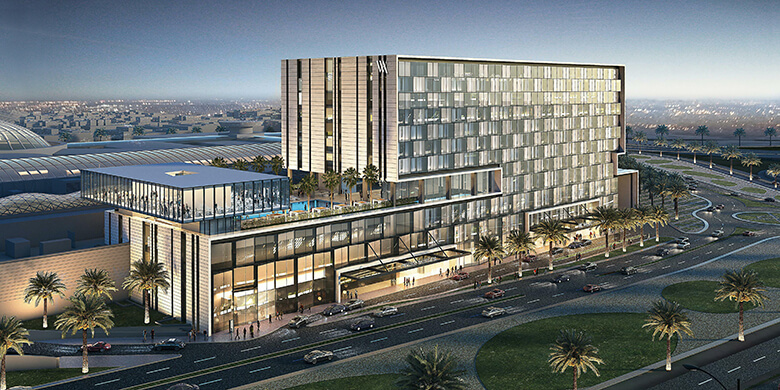
A Strategy for the Future
Without a doubt, the falling price of oil has had a significant impact on business in the region and spurred a transformation imperative. Budgets for public sector work have generally downsized as a trend across the region. In actual fact, 2018 was a transformative year for the construction industry with an explosion of new technology and innovation. Digital is transforming the construction industry itself and helping to create the cities of tomorrow.
“Firms operating in this industry have a unique opportunity to leave a mark on future generations through designing and building smart cities of the future, using advanced technologies to assist productivity and reduce waste,” explains Tarek. “Furthermore, these same technologies hold the promise to help firms reduce costs while improving margins. Firms that embrace innovation via the projects of tomorrow and invest in digital transformation will be the ultimate winners.”
Many award-winning cultural, tourism and leisure edifices have been developed around the region, with more eco-friendly and sustainable solutions employed to mitigate the harsh climate cost-effectively, while maintaining the indoor/outdoor feel required for these establishments. Co-working spaces have also been popping up all over the country, with the rise of entrepreneurs and creatives helping to establish new businesses to address the post-oil economic challenges.
“My commitment to our ongoing business transformation is resolute,” says Tarek. “Whilst our market has seen steady growth, it has also become more challenging with the digitisation of processes and design delivery (eg Building Information Management), clients demand for more sophisticated, value driven and innovative solutions, and increasing international competition in architecture and design. It therefore became clear that we needed to deliver key strategic internal projects to be able to manage an increasing number of complex projects and deliver our commitment to our employees, clients, and markets.
“With this in mind, the firm has created the Pace Leadership Team to steer the development of our business strategy. In 2019, two key programmes will be embarked upon. The ‘Pace Delivery Process’ and ‘Talent Management’ projects are aimed at future proofing the quality of our work and investment in our people. These projects have been established to innovate the way in which Pace design and deliver projects through critical design thinking in all disciplines, and with an efficient and fully digitised process.”
Diversification is a Pre-requisite for Success
Over the next five to 10 years,clients will seek to continually diversify their economies and projects, attracting wide-spread investment in non-oil related industries. This in turn will put the emphasis firmly on the construction industry, as countries look to suppliers to make good on investments in infrastructure and property. As a result, as can be seen in Kuwait with ‘Vision 2035’ and in countries such as Saudi Arabia with its long term development plan ‘Vision 2030’, all major sectors will play a vital part in the future growth of the region, including building infrastructure.
“Diversification is not a choice, it is an economic necessity for the continued success of our region as a whole. Leaders in both the government and private sector must embrace new ideas, innovate and take risks. We as a firm are seeking new ways to do business, being adaptive and agile to change, investing in sustainable technologies and new methods of working to improve our overall productivity,” Tarek concludes.
PACE
P.O. BOX 1031
KUWAIT CITY
KUWAIT
T: +965 22669600
E: COMMUNICATION@PACE-ME.COM
W: WWW.PACE-ME.COM
